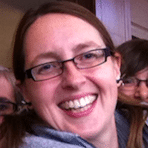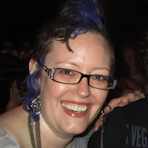
Megan Tucker
Name: Megan Tucker
Age: 35
Hometown: Winnipeg
What was/is your diagnosis? Stage 3 Colon Cancer. Positive for Lynch Syndrome (HNPCC).
What school did/do you attend? Red River Community College
What is your career goal? To find a job I enjoy and that fulfills my need to provide a positive contribution to society.
What is your occupation? I’m currently the Manager of Retail operations for the Winnipeg Goldeyes Baseball Club, and was at the time of my diagnosis as well.
Your cancer experience:
How did you find out you were sick? What led to your diagnosis?
I experienced blood in my bowel movements and a worsening abdominal pain for approximately two years. I continued to believe it was nothing more than really bad lactose intolerance (yes I was ignoring the seriousness!). I’d alerted my doctor, but she too wasn’t overly concerned (“hemorrhoids,” I believe is what she said it was).
What year was it? What was your age at the time?
I first noted the problems with my family doctor in August 2009, but wasn’t taken seriously until March 2011 and wasn’t diagnosed until July 2011. I was 31 when I first became concerned and 33 when I was finally scoped and diagnosed.
In which hospitals are/were you treated?
Laproscopic surgery at St. Boniface General Hospital (with an outstandingly talented doctor), and six months of chemotherapy at the Health Sciences Center in Winnipeg
At what level of education were you at diagnosis?
I graduated college in 2000 and was enjoying the education that comes with simply living.
What were your first thoughts when diagnosed?
“I should’ve known—now lets get this fixed.”
How did your family react?
They were all shaken to the core (my father passed away from various cancers at age 57), but were all ready to face the challenge by my side. My mom ended up moving back to Winnipeg from Kelowna, BC to help care for me after surgery and just to be close during treatment.
How did your friends react? Were you treated differently, or did things remain the same?
Things were for sure different—for me as well as for them. I was no longer the carefree “try to do it all” girl and they sensed the new restraint. At my age, I don’t have a huge group of friends, but it clearly took the solid friends I have by complete surprise—we all seemed to be facing mortality.
What did your treatment consist of?
Medical side: I received seven hours of Laproscopic surgery to remove 80 per cent of my colon in August 2011. (My cancer had spread to my Lymph nodes and I was at a high risk for a hereditary cancer so the hope was to stave off further cancer.) Recovery in the hospital sucked; I was nauseated and the hospital food was repulsive. At home, I took myself off the pain meds that were making me delirious, switched to some extra strength acetaminophen, and actually started to improve. A walk to the front street and back was an impressive feat!
Following a six-week recovery, I met with the oncologist and was informed I would undergo 12 adjuvant treatments with Modified Folfox 4. I became intimately familiar with a PIC line and every second Monday I would “hang” in the Chemo Room at HSC in Winnipeg receiving six hours of IV chemo and then go home with a pump that was disconnected 48 hours later.
The treatment I had doesn’t generally make you lose your hair, though mine did thin. Worse for me was the associated neuropathy. It began immediately following my first treatment (no one told me this would happen so fast!). It started in my fingertips, then spread to my nose, mouth, tongue, lips and finally my toes. The neuropathy is always at it’s worst when exposed to cold so I couldn’t drink anything cold, or touch anything cold from the fridge, etc. Living in Winnipeg, this was a bit of a challenge.
I did end up back in emergency twice for different reasons, the cause of which we never did determine.
I’m now almost a year out of treatment and can once again feel my fingers, however, my feet have still not gotten any better. As a result I occasionally struggle with balance, and being very active, as I’m never sure where my feet really are.
During the summer of 2012 I received a further diagnosis: I tested positive for Lynch syndrome (also known as HNPCC), a hereditary disorder that gives me an elevated risk of a multitude of other cancers.
Non Medical: I was completely oblivious. I was convinced I’d be back at work after only two weeks recovery. Reality #1: the full six weeks was necessary. I became frustrated and angry often, and would continually push myself as far as the nausea and discomfort would allow. I was scared of ending up back in the hospital; I just couldn’t associate that place with a place of healing so when I finally started to feel human again, it felt momentous!
Following my six-week recovery, I really figured I’d just get to pick up where I left off, but finding out I’d need 6 months of chemo felt even more fatal than the original diagnosis did. (I cried more over the chemo then I did when I found out I had cancer.) The chemo wasn’t terrible to start, though the neuropathy really did suck. I worked through as much as I could, but nearer the end, the best I could manage was one week at work and one week off. I really wanted to be done treatment so when I was delayed due to illness, I was beyond angry. Even though it meant a break that coincided with Christmas, I couldn’t see past my anger. When I finally did let go of the anger I really did enjoy the break and was actually grateful for the time off.
The cumulative effects of the chemo really started to hit me after about the fifth treatment. I will never forget being so exhausted. I ate a primarily vegetarian diet that included copious amounts of fruits and veggies before I was diagnosed. I never drank pop or cared much for candy—fruit was nature’s candy! Thanks to chemo and a healthy dose of steroids, I now hated the taste of water (it—along with almost all food—tasted like chemo). Not pop, though, or candy, or any number of other things that weren’t good for me. So, I have now spent months detoxing my body and doing away with some nasty habits!
What is your current medical status?
I guess I’m now “cancer free” and will be CT’d and scoped annually with blood tests every three to six months.
How is life different for you now post diagnosis?
Life is just different. I’m constantly trying to explain to doctors that what I describe of how my body now works is not “a problem” but instead it’s “my new normal,” as is needing access to bathroom facilities about four times as often as my counterparts (small price to pay).
On top of that, I’m no longer convinced the messages my body sends me are “nothing to worry about.” Knowing I have a genetic disorder like Lynch Syndrome, I have to balance diligence regarding my health with how easy it would be to overreact to even the smallest change in my body.
My energy levels aren’t 100 per cent back, and I’m not capable of partying ‘til all hours of the night—nor do I want to be so hard on my body. My body has been through a lot and it deserves a break now and then. It also deserves better care and fuel. I’m also not so hard on my emotional self any more. I try not to “should” on myself too much.
I probably won’t go back and get a university degree. Instead I’ll take chances and apply for jobs I may never get, but that really sound fun, interesting, and challenging. I’ll even take a course or two or three that pique my interest, just for the fun of learning instead of for the expectation that it will further my career.
I love my friends and no longer say “we should get together sometime.” Instead, I prefer to open up my calender and book the time to see them right then and there!
Spiritually I choose to honour the mind and body I have, and all that it has done for me, and to be grateful for what I do have and am capable of. I have been given rare gifts of love, friendship, support, and laughter and will not take that for granted
What is the toughest part of your challenge?
Knowing nothing will be what it once might have been. Sometimes, all your hard work gets tossed by the wayside and there’s nothing you can do to get it back.
What was the best lesson you took away from your challenge?
Knowing nothing will be what it once might have been. We really are an adaptable species and not only can we survive, but we can thrive in the new reality—no matter what the challenge is, or how much it changes us.
What really motivated you to keep going while you were sick?
Getting better. I just couldn’t imagine living like that any longer than I had to. I just don’t take well to having someone tell me what my limits are.
What are your thoughts and feelings about your illness now? How have they changed since before your diagnosis?
I’m a little less angry, a little less fatalistic, and I “fear less.” I’m still scared—having a genetic disorder predisposing you to have cancer will leave you scared. I’m just choosing to not be as scared and to just enjoy the times I do have. I always worried before that if I got cancer my life would mimic my father’s (12 years of one cancer diagnosis after another, and dead at 57). Now I know my fate and life is my own, and it will be unique to me.
What are some preventative measures people can take to lower their risk of having an experience like yours?
Being that my cancer is hereditary there’s not much preventative one can do. That said—KNOW YOUR BODY and advocate for yourself; be the squeaky wheel! Be annoying if you have to, but don’t let a professional deter you if you know or are even “pretty sure” there is something not right.
Did you attend any support groups during your challenge?
No, I never attended any support groups. I was actually told by almost all the health care professionals that any support group for colon cancer would likely be a waste of my time as I was at the least half the age most were likely to be, meaning it was unlikely I would be able to relate to them, nor they to me. I think one aimed at young adults would’ve been helpful (in fact having been to Retreat Yourself East, I KNOW it would have helped!)
How are you connected with Young Adult Cancer Canada?
I have now attended the Retreat Yourself East 2012 and am on the waiting list for the 2012 survivor conference.
I found YACC through following Wellspring in Toronto on Twitter. That said, early on in my diagnosis I met with Dr. Anne Katz and she recommended them to me. Sadly, I misplaced her card in a sea of other cards and literature I’d received early on only to find her card with the recommendation on it two weeks ago when I was shredding a year’s worth of chemo appointment letters.









